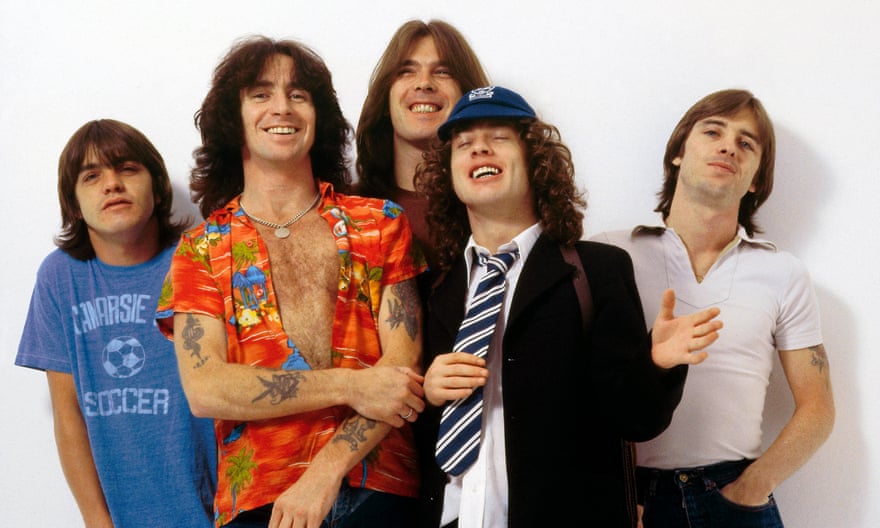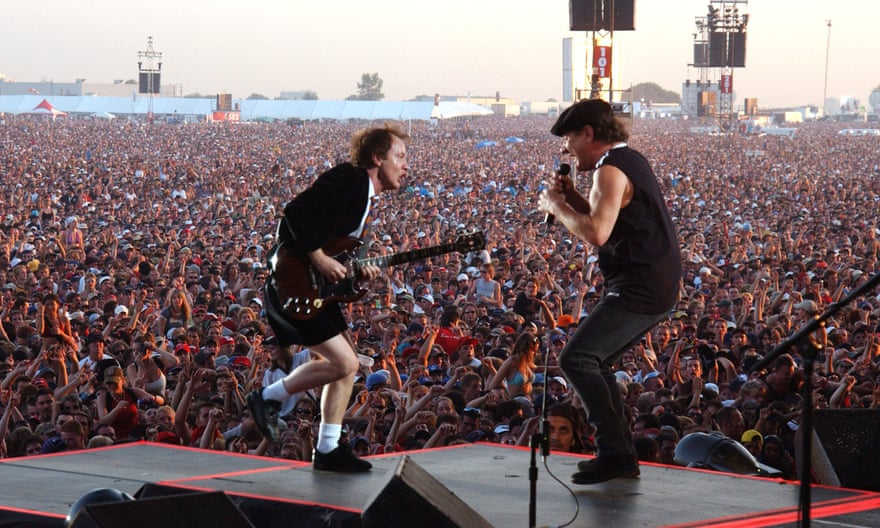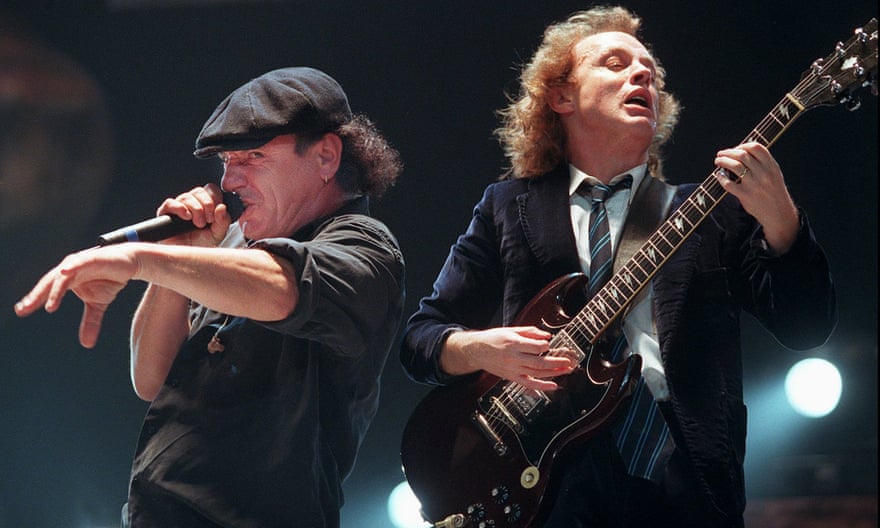What Is the Main Melody in Blues After Dark
40. Soul Stripper (1975)
In their infancy, AC/DC weren't tied to one style. Their first Australian album even featured this intriguing example of a kind of troglodytic hard-rock funk, with cowbells and bongos, neither of which were to become staples of the Akker Dakker sound.
39. Rock'n'Roll Train (live, 2012)
For many years now, the best AC/DC track on any given album has been the lead single. That was the case on 2008's Black Ice, though I would direct you to the version on Live at River Plate, just for the force of the band's entry.
38. High Voltage (1975)
"And you ask me why I'm in a band / I dig doin' one night stands," sings Bon Scott in one of his many considerations of the life of the struggling rock'n'roller. It is hardly imaginative musically – a simple boogie shuffle – but feel the hard dryness of the sound.
37. Play Ball (2014)
The lead single from – to date – the last AC/DC album, assembled from Angus and Malcolm Young's offcuts: the one song from Rock or Bust that really sounded like it might have fitted on to Back in Black without too many raised eyebrows.
36. Bedlam in Belgium (1983)
After three albums with Mutt Lange, the Young brothers took control for Flick of the Switch. Viewed as underwhelming at the time, it now sounds like a masterpiece compared to much of what followed. A little muddy, perhaps, but this is a great riff.
35. Evil Walks (1981)
A monstrous opening for a deep cut from the last of the Lange albums: it sounds like being engulfed in an avalanche – and a slightly incongruous introduction to the bouncy riff of the verses.
34. Stiff Upper Lip (2000)
The Youngs' older brother George – who, with Harry Vanda, had overseen their early albums – returned to produce Stiff Upper Lip. It wasn't an album of huge riffs – it was more concerned with the texture of the sound. This eponymous song is good, but not classic.
33. Hail Caesar (1995)
Rick Rubin should have been the perfect AC/DC producer, but Ballbreaker sounded oddly emasculated, without the jet roar of the guitars. On the twisting, tumbling Hail Caesar it worked, though.
32. Ain't No Fun (Waiting 'Round To Be a Millionaire) (1976)
This gains its place not for the melody – which is almost nonexistent – but for being one of Scott's best lyrics: "I've got patches on the patches of my old blue jeans / Well, they used to be blue / When they used to be new / When they used to be clean."
31. Big Gun (1993)
A rare one-off, from The Last Action Hero soundtrack, that really deserved saving for an official album: terrific riff, good recording. Oddly, it has never been played live, although, given that AC/DC sets tend consist of three tracks from the new album, plus the setlist from 1980, maybe that's not surprising.
30. Jailbreak (1976)
Only Scott would have considered opening a single with the line, "There was a friend of mine on murder, and the judge's gavel fell …" It's thrillingly minimal, and it's well worth having a look at the compellingly terrible video, too.
29. Moneytalks (1990)
It Is hard to describe anything AC/DC do as out of character – rarely has one band maintained a single character trait with such devotion – but the opening and chorus melody of Moneytalks is peculiarly reminiscent of latter-day E Street Band, melancholic and triumphant.

28. Nervous Shakedown (1983)
The lazy slowness of Nervous Shakedown allows the listener to really hear how the pieces of the AC/DC machine interlock and swing around each other. It should always be remembered that AC/DC roll as well as rock. No idea what a nervous shakedown is, though.
27. Have a Drink On Me (1980)
"Lads, our old lead singer just died of acute alcohol poisoning. We need a cheery song. What shall we write a song about?" "How about having a great time drinking yourself insensible?" "Great idea!" Only in AC/DC's world …
26. Overdose (1977)
This deep cut from Let There Be Rock has a guitar sound so filthy you could spend the rest of your life scrubbing it with industrial-strength cleaner and you still wouldn't get the muck off. The best AC/DC songs make the bassist play root notes. This is a bass root note song.
25. Hell Ain't a Bad Place To Be (1977)
Listen to the way the chords chop off, how nothing is sustained in the verses. Although AC/DC always disdained punk, they could easily have fitted in had they any interest: no band sounded tougher and rougher in 1977.
24. If You Want Blood (You've Got It) (1979)
Borrowing the title from their live album of the year before, If You Want Blood showed – with the help of Lange – that AC/DC could marry their piledriver force to actual pop hooks. The Highway to Hell album is full of those moments: Get It Hot, Girls Got Rhythm, Shot Down in Flames.
23. Who Made Who (1986)
Recorded for a movie (Maximum Overdrive), and given a terrible mid-80s production, Who Made Who should be a throwaway. In fact it's great: the interplay between the guitars, with actual arpeggios, makes it sound just like AC/DC were evolving. They weren't, though; not really.
22. Heatseeker (1988)
Even on their most disappointing albums, there was always at least one absolute cracker. On Blow Up Your Video, that was Heatseeker: frenetic, joyful, and proof that AC/DC weren't yet a spent force. You do not need to visit this album for any other purpose.
21. Gone Shootin' (1978)
The best AC/DC album, Powerage, is the most downbeat. Here, to a riff that's reined right in, Scott sings of a heroin-addict girlfriend, with one line so perfect in its plainness and construction that it is shocking: "I stirred my coffee with the same spoon." This entire album is downbeat and desperate – there's not a party in sight.
20. Hard as a Rock (1995)
Rubin did get the opening track of Ballbreaker absolutely right: the spacious, arid production on Hard as a Rock was the closest the band had got to the sound of the Vanda/Young productions since dispensing with the pair. And the beautiful simplicity of the main hook – Angus's little jangle over Malcolm's two-chord pattern – is a perfect piece of AC/DC.
19. TNT (1975)
Still a live staple, and the reductio ad absurdum of Scott's lyrical malevolence. If he were to fight you, he would need neither knife nor gun, because it turns out he is literally explosive. And, of course, a magnificent riff.
18. Rock'n'Roll Singer (1975)
Scott is, perhaps, the best ever writer about being in a struggling band; he spent years trying to make if before joining AC/DC. This one is about why he would choose that life – because he refuses to be a hypocrite: "You can stick your nine-to-five living / And your collar and your tie / And you can stick your moral standards / Cos they're all a dirty lie." But why a rock'n'roll singer in particular? "I hear it pays well!"
17. Dirty Deeds Done Dirt Cheap (1976)
Just in case TNT left you unclear about whether Scott was willing to commit violence, here is clarification. He can offer assorted forms of contract killing at very competitive rates. The backing vocals – which sound like they come from a troupe of disgruntled goblins – always make me laugh.
16. Sin City (1978)
Sin City hits like a heavyweight: a spidery guitar line, then four chords, repeated four times, like a boxer's punch combinations. Though AC/DC were never truly a heavy metal band, Sin City was as heavy as anything you might have heard in 1978, pounding and brutal, and as nihilistic as anything by the Pistols.

15. For Those About to Rock (We Salute You) (1981)
The song still finishes their live shows, if only because you can't really deploy cannons partway through, and it is magnificently preposterous – taking its title from the salute to Roman gladiators. Even here, Johnson managed to squeeze in a double entendre: "Pick up your balls and load your cannon." Fnarr fnarr.
14. It's a Long Way to the Top (If You Wanna Rock'n'Roll) (1975)
Set aside the jokey alternative lyrics about sausage rolls and salute the magnificent lunacy of a band who thought nothing of slapping a bagpipe solo into a single, which rather undercuts the central message of the song: "Gettin' old, gettin' grey / Gettin' ripped off, underpaid / Gettin' sold secondhand / That's how it goes playin' in a band."
13. Touch Too Much (1979)
The changes Lange brought to AC/DC were most apparent on Touch Too Much. The demo version sounds nothing like the eventual recording, and the eventual recording sounds like little else by AC/DC. What it sounds like is Lange: a conjoined construction of hooks, designed for radio.
12. You Shook Me All Night Long (1980)
A simple explosion of sexual joy (with customarily odd lyrics: "She had sightless eyes / Tellin' me no lies / And knocking me out / With those American thighs"), set to a magnificent, Stonesy riff that bursts into a huge chorus. Back in Black's lead single proved that even without Scott, AC/DC had something special on their hands.
11. Ride On (1976)
Regarded by many fans as the band's most heartfelt song (and a favourite of Belle and Sebastian's Stuart Murdoch), this mournful blues has no hint of celebration. It's just a man constantly trying to find what he seeks, always having to ride on to do so: "One of these days, I'm gonna / Change my evil ways / Til then I'll just keep dragging on."
10. Down Payment Blues (1978)
This is the best of the poverty songs that popped up time and again across the first few AC/DC records, and a superlative performance from the whole group: the music builds and builds and builds, and Scott graces it with a wonderful, desperate vocal. He sounds like a man clinging to society by his fingernails.
9. Riff Raff (live, 1978)
It scorched on Powerage, but the version on the live album If You Want Blood You've Got It doesn't just scorch, it spits fire. You can hear the amps humming before the band begin that opening, ratcheting up the tension until they pause, letting the sound fade … then that brilliant and brutal riff breaks like a storm.
8. Thunderstruck (1990)
As Brian Johnson told me in 2014, regarding this thrillingly fiddly riff: "Angus, when he goes back onstage, he knows he's got this thing to do – the start of Thunderstruck. Fucking nightmare! Angus once said to me: 'If I don't do that two or three times a day in my room before I go on, I can't fucking do it.'"
7. Highway to Hell (1979)
Duh-duh-duh, duh-duh-dah, duh-duh-dah duh-duh-dah duh-dah-dah. You know exactly what I'm telling you. In fact, I bet you were hearing the drums come in once the riff starts repeating. The lyrical concept is hardly original, but who cares when the riff is that brilliant?
6. Hell's Bells (1980)
The Back in Black album opened with a tolling bell, joined by a desolate guitar line, then a simple drumbeat, before the rest of the band came in. Only after 80 seconds was the main riff revealed, and it took nearly a minute and a half for Johnson to make his entrance. It's as famous for its accompanying stage prop these days, but this is perfectly constructed hard rock, right down to its dramatic, combustible Angus solo.
5. What's Next To The Moon (1978)
Restrained and taut, like a coiled spring, and given a great lyric byScott: a surreal and violent fantasy that manages to encompass silent-movie peril scenes, Casey Jones, Superman and film noir. AC/DC rarely sound mysterious; they do here.

4. Let There Be Rock (1977)
Given a bit of success, Scott stopped bemoaning rock and started celebrating it: this is AC/DC's version of rock's creation myth: "In the beginning, back in 1955 …" The riff surges and breaks, like an ocean storm forcing waves on to the shore. Live, it traditionally houses Angus Young's solo spot and stretches on: the studio version is all discipline.
3. Back in Black (1980)
You might say Highway to Hell was AC/DC's greatest riff. But then you hear Back in Black. So simple, but there's so much going on. The descending spiral at the end of the first reading of the riff, the little musical hiccups at the end of the second. And, as on all the best AC/DC songs, feel the space that allows those details to be so evident. Great songs leave things out, rather than adding them.
2. Whole Lotta Rosie (live, 1978)
And you might say Back in Black was AC/DC's greatest riff. But then there's this, voted the greatest ever metal song in the first edition of Kerrang! The version on If You Want Blood shaves more than a minute off the studio version, and it's better for it, because that extra minute is all soloing, and this song is entirely about the power of its riff.
1. Live Wire (Live From the Atlantic Studios, 1977)
OK, this is almost certainly not the No 1 that most AC/DC fans would pick. But the version of this 1975 track that opened a live radio promo album two years later – since commercially released – is the purest demonstration of what AC/DC are about: a performance that is both thrillingly raw and unerringly precise. It's also the greatest tribute to Malcolm Young, who never took a lead vocal or played a solo, but who was the beating heart of the band. "Most people can do what I do – they can do guitar solos – but they can't do a good, hard rhythm guitar and be dedicated to it," Angus Young told me. Nobody did it better than Malcolm Young.
Source: https://www.theguardian.com/music/2020/jul/30/acdc-their-40-greatest-songs-ranked